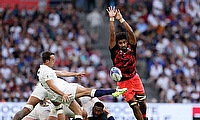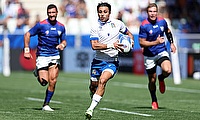Six Nations CEO Ben Morel on Netflix docuseries speculation and global calendar
Ahead of the 2022 edition of the Autumn Nations Series, Six Nations Rugby CEO Ben Morel said he would provide no comment when asked about reports linking the competition to Netflix.
It was last Friday night that City AM reported that the Six Nations were set for a Netflix show that would emulate the hit Formula 1 series, Drive to Survive.
Speaking at the Autumn Nations Series launch event in central London, the CEO did not dismiss the notion of a documentary completely as rugby looks to break into new markets.
Launched in 2019, Drive to Survive allowed Formula 1 to break into the US market, a market the global brand had largely failed to crack until the series made its way to the streaming platform.
In a breakdown tweeted by Nathan Baugh last week, it was explained how the purchase of the motorsports competition by Liberty Media in 2016 led to Formula 1 being branded as a content company and two years later the docuseries was announced.
Upon its release, and in spite of Mercedes and Ferrari refusing to be involved, the series was a near instant success. It stripped back the barriers between drivers and fans, while also giving a whole view of every team.
More important than the onscreen product was the growth elsewhere. This included a 40 per cent growth in US viewership and the most attended race ever, when 400,000 people attended the US Grand Prix in 2021.
In addition to that, Formula 1 has seen its valuation grow from an already staggering $8B to an eyewatering $13B in those three years, with many attributing the docuseries to this unprecedented growth.
It becomes easy to see why Morel and the Six Nations are more than willing to allow cameras behind the scenes.
“We are in the authentic, unpredictable storytelling business,” Morel said. “We are about telling wonderful stories that are real, they’re not fake, they are happening in front of us. That’s what sport is all about.
“The live broadcast is an essential element to that. Because that is when it happens. You can watch a movie whenever you want, live broadcast you don’t have a choice. Sport has such an advantage to capture the attention.
“Even casual fans, because ‘you have to watch it now’. You can’t wait. Doing the stories around the live broadcast is fundamental but getting to know the heroes of the game is fundamental.
“That has to be done through social media, through getting to know them in documentaries, so all of that goes in the right direction.
“We need to celebrate our heroes of the game more, we need to work more closely together on this, again with the players, but also club and international.
“I want to know more about Antoine Dupont whether he’s wearing a Toulouse shirt, whether he is training, playing for his club or preparing for a Six Nations match or scoring tries on the live broadcast.
“We want to celebrate our heroes and the only thing I would say is, there is no one solution. You have to do it all. You also need to make sure that your game is accessible and easy to understand.
“You need to work on all angles. There is no simple answer, but you need to roll up your sleeves and look at all angles.”
Quickly after saying this, Morel stated that he would not be “drawn into any ‘this is happening or not happening’”, although from his comments prior it was clear that there is certainly something to those reports that emerged a week ago.
What is abundantly clear at this moment in time is that the game is in need of innovation. This can no more be seen than in the recent developments in the Gallagher Premiership, where both Wasps and Worcester Warriors have entered administration. While opening the game up is one option, another topic discussed was the establishment of a global calendar.
A redevelopment of the game’s schedule, which World Rugby say would be the “key to increasing interest and value”, in 2021 it was made known that changes with the calendar would not be made until 2024, the talks around these changes having been ongoing since 2020.
Hoping to establish a sort of ‘Nations Championship’, which would not clash with the Rugby World Cup or British and Irish Lions, is something that the game’s governing body says unions, clubs and players are all in favour of.
Maintaining the Six Nations as a standalone competition, Morel stated that an agreement had “never been closer” and confirming that any sort of announcement is some time away.
“We are still realistically several months away from knowing everything that needs to be solved,” he said. “In terms of what the elite competition looks like, we are pretty much close on that one, but we want to solve other things for the rest of the game. So that’s key.
“I am not the only one who can put the timeline, and actually sometimes a timeline can be a catalyst to making it happen, sometimes they can be counterproductive. If we have never been closer, let’s give us the time.
“We are not looking to launch that next year either, so we have got a bit of time. Let’s do it right.”
Whichever way you look at it, there is immense change afoot in the world of rugby. Spurred on by the downfall of two historic teams or through the success of another sport thanks to opening it up to new avenues or even a rearranging of the calendar, change is coming.
Change in whatever form that might be should only be beneficial for a game that has had relatively few positives to talk about in recent weeks.
Anything that can be done to breathe new life into the sport should be seen as a positive at this moment of time, the long-term success of the sport very much on the line in the face of such successes elsewhere.








